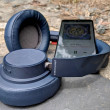Review: Sony Ericsson Vivaz
Here's where a solid piece of hardware meets its demise. The Vivaz has perhaps one of the most awful, confusing, and unusable user interfaces I have ever encountered on a mobile device.
The Vivaz is based on Symbian^1 - better known as S60 5th Edition - and has been given a custom skin by Sony Ericsson. Given my experience with S60 devices, I thought mastering this new phone would be a piece of cake. The Vivaz is more like a 30-layer cake with different flavored icing in between each layer, with 6,000 candles on top.
First, the home screen: At first boot, the Vivaz has a mostly-blank home screen. At the top are five icons arranged in a dock. At the bottom is a black box that has shortcuts to the phone, media, messages and search tools. This box appears randomly on the central home screen. Some times it is there, and some times it is not. There is no explanation for its behavior.
The central box at the top of the screen indicates the home screen. To its left is a Twitter icon and a Contacts icon. You can swipe to reach them, or tap the icon at the top of the page. To the right of the main home screen is a media player that automatically displays the last picture you took and starts a slide show (this could be dangerous!) The last icon is a page reserved for shortcuts. The shortcuts can be customized by the end user, though several shortcuts are pre-loaded. The problem is, it takes two swipes to get over to the shortcuts. It is sometimes faster to use the main menu instead, negating the usefulness of having shortcuts.
Let's circle back to the buttons on the front of the Vivaz. The central button on the bottom of the Vivaz opens the main menu. Many other touch phones use the central button to return users to the home screen. On the Vivaz, it opens the main menu, no matter what other app or service you might be using. Pressing and holding the main key opens the same multitask tool found on Nokia S60 devices.
The main menu is a plain grid of applications and folders similar to what you'd find on any S60 device. There is an options function accessible from the bottom left corner, and an Exit button from the bottom right.
What really bugs me is this: just as on Nokia's touch-based devices, some icons need to be tapped twice — once to select, once to open — and others only need to be tapped once. An application, for example, can be tapped once to start it. Folders or settings need to be tapped twice. This is infuriating and makes no sense whatsoever. Additionally, once you dig down beyond the top-level menus, things revert to the ugly S60 text-driven menus. These are not finger-friendly at all. Mixing inconsistent tap once or tap twice behavior with poor menus and terrible screen performance makes for an infuriating experience.
The good news is that you can change this UI skin - which Sony Ericsson refers to as a theme - to one of several other skins. Unfortunately, none of them are better, and they actually duplicate functions. For example, all of the other UI skins have three buttons to reach the main menu from the home screen. That's just silly. Most of them are clearly cut-and-pasted from Nokia's S60 home screen behavior, complete with the tabs across the top when drilling down deep into the menus.
Nothing about the Vivaz menu system is seamless, nothing about it makes sense, and I imagine most users will dislike it intensely.
Also, don't be surprised if the Vivaz yells at you for leaving too many applications running in the background. It "runs out of memory" far too often for a modern device, forcing users to quit their current task and go out and close some of the other apps before proceeding.









 Asus ROG Phone 7 is a Gaming Powerhouse
Asus ROG Phone 7 is a Gaming Powerhouse
 Motorola Updates its Most Affordable Phones
Motorola Updates its Most Affordable Phones
 Sony Updates Flagship Phone With New Camera
Sony Updates Flagship Phone With New Camera
 Samsung Brings its Military Phones to First Responders
Samsung Brings its Military Phones to First Responders
 Google Pixel 8 Series Saves the Best for the Pro
Google Pixel 8 Series Saves the Best for the Pro
 Sony Ericsson Vivaz
Sony Ericsson Vivaz








